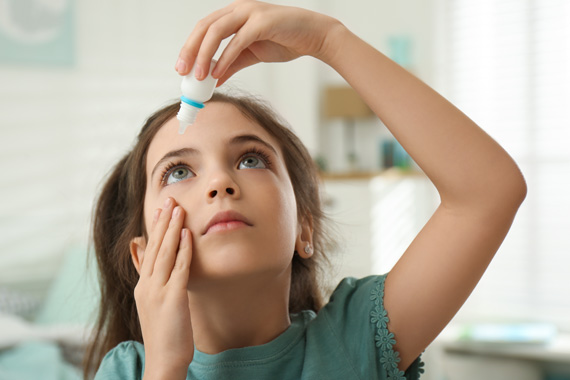Myopia Management In
Mount Clemens, MI

What Is Myopia?
Myopia, or nearsightedness, is a condition where the eye grows too long from front to back, preventing light entering the eye from focusing perfectly on the retina. This results in objects that are far away to become blurry or out of focus, while near objects such as a book or tablet remain clear. Myopia is becoming much more common in children at younger ages than ever before. Researchers believe that increased screen time combined with reduced outdoor time is to blame for this sudden increase. While myopia can be corrected with glasses, there is no known cure for myopia at this time.
The Dangers Of Myopia
While undiagnosed myopia can lead to difficulties in school and extracurricular activities, the most concerning problem is the increased risk of eye disease associated with myopia throughout a person’s life. Studies have shown that patients with myopia are more vulnerable to a range of sight threatening conditions, including cataracts, retinal detachment, and maculopathy. For this reason, it is critical to be proactive at slowing the progression of myopia as a child to reduce the total amount of nearsightedness as an adult and minimize risk for eye disease later in life.
Myopia Management Solutions
While glasses correct your child’s blurry vision, they do not prevent their vision from continuing to worsen. Fortunately, there are three non-invasive treatments that can be prescribed to slow the progression of myopia in children: overnight contact lenses (orthokeratology), daytime soft specialized contact lenses, and prescription eye drops.

Ortho-K
Orthokeratology, or ortho-k, lenses are a type of specialized contact lenses designed to be worn only at night. These custom contacts gently reshape the front of the eye while you sleep, a process that corrects your vision so when the lenses are removed in the morning, patients can see clearly without the need for daytime correction. The concept is similar to a retainer worn overnight prescribed by an orthodontist. The lenses must be worn each night for vision to be corrected and to slow progression of nearsightedness.

Multifocal Contact Lenses
These specialized soft contact lenses are designed to be worn during the day and removed at night. Their specific optical properties redirect light on the retina in a way that helps slow down the progression of nearsightedness, and also corrects vision, so your child can continue throughout the day without the need for glasses.

Prescription Eye Drops
Another treatment option is a prescription eye drop called atropine which has been found to slow the progression of nearsightedness when compounded into a very low dose formula. The drops are intended to be used before bedtime. Your child will still need to wear glasses or contact lenses during the day to see.
Ortho-K

Orthokeratology, or ortho-k, lenses are a type of specialized contact lenses designed to be worn only at night. These custom contacts gently reshape the front of the eye while you sleep, a process that corrects your vision so when the lenses are removed in the morning, patients can see clearly without the need for daytime correction. The concept is similar to a retainer worn overnight prescribed by an orthodontist. The lenses must be worn each night for vision to be corrected and to slow progression of nearsightedness.
Multifocal Contact Lenses

These specialized soft contact lenses are designed to be worn during the day and removed at night. Their specific optical properties redirect light on the retina in a way that helps slow down the progression of nearsightedness, and also corrects vision, so your child can continue throughout the day without the need for glasses.
Prescription Eye Drops

Another treatment option is a prescription eye drop called atropine which has been found to slow the progression of nearsightedness when compounded into a very low dose formula. The drops are intended to be used before bedtime. Your child will still need to wear glasses or contact lenses during the day to see.
Why Choose LaCroix Eye Care?
We understand the importance of early intervention to preserving your child’s vision and eye health, which is why we make it a priority to invest in industry-leading solutions for effective myopia management. Our doctors of optometry will thoroughly evaluate your child’s vision and discuss the treatment options together, creating a customized plan that makes sense for you and your child. We’re here to help guide you towards a lifetime of great vision. Schedule an appointment with us today!


